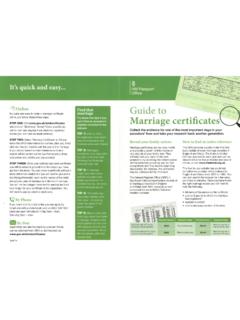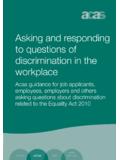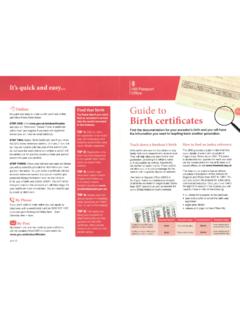Transcription of Inheritance Tax Guide - Solicitors For Older People Scotland
1 Inheritance Tax Guide For more information or to speak to one of our trained advisers please telephone our team on 0800 152 2037. Solicitors For Older People Scotland 3/12/2014. CONTENTS. Guide TO Inheritance TAX .. 3. WHAT IS Inheritance TAX? (IHT).. 3. Who Pays Inheritance Tax? .. 3. What Rate Of Inheritance Tax Is Payable? .. 3. WHAT IS A TRANSFER OF VALUE?.. 4. Lifetime Chargeable Transfers .. 4. Exempt Transfers .. 4. WHAT ARE THE RELIEFS AVAILABLE? .. 8. USING EXEMPTIONS AND RELIEFS .. 9. GIFTS WITH RESERVATON .. 9. CAPITAL GAINS TAX (CGT) .. 10. TRUSTS .. 11. How does a Trust work? .. 11. NRB Discretionary Trusts .. 11. What is a NRB Discretionary Trust? .. 11. PENSIONS .. 12. PAYMENT OF THE IHT BILL .. 13. MAKING A WILL .. 13. WHAT YOU SHOULD DO NOW .. 13. CONTACT US .. 14. Page 2.
2 Guide TO Inheritance TAX. Many People are under the mistaken apprehension that Inheritance Tax is a tax on the wealthy. This statement might have been accurate when it was first introduced in the 1970s but due to recent surge of property prices it can no longer be relied upon. If we have thought about Inheritance Tax, many of us have concerns that any property we leave on death will not go to our family as we would wish but instead will find itself in the tax man's pocket. Unfortunately paying our taxes is a fact of life. Inheritance Tax, however, is slightly different as with a bit of forward planning many People will certainly manage to reduce, and in some cases, completely avoid, their liability to Inheritance Tax. Exemptions and reliefs to the tax can be constructively used to minimise liability.
3 To aid People with their concerns we have prepared a Guide to Inheritance Tax to give the reader a better understanding of when and how the tax is paid. The Guide will also highlight ways in which your liability to Inheritance Tax can be reduced if not avoided. WHAT IS Inheritance TAX? (IHT). IHT may be payable on an individual's estate on death or on certain gifts made during the lifetime. The tax legislation states that IHT is payable on chargeable transfers of value made by persons during their lifetime or on death. For IHT purposes when a person dies they are deemed to have made a transfer of all their property. Although some People may become liable for Inheritance Tax during their lifetime as they have made lifetime chargeable transfers (this will be explained later in the Guide ) the majority of People will only become liable to pay IHT on their death.
4 WHO PAYS Inheritance TAX? IHT is payable by People who are domiciled in the UK. If you have the UK as your permanent home all of your assets, with a few exceptions, will be subject to IHT. Please note that even if you are not domiciled in the UK, any assets held in the UK will be subject to IHT. WHAT RATE OF Inheritance TAX IS PAYABLE? The rate of tax chargeable on lifetime transfers is 20%. The rate of tax on death is 40%. IHT will only become payable if the chargeable transfer exceeds the Nil Rate Band (NRB). The NRB tends to change at the start of any new tax year. The current NRB for tax year ending April 14 stands at 325,000. EXAMPLE. John, a widower, dies in June 2013. He leaves a net estate of 412,000. The whole estate has been left to his 2 children. The IHT is calculated as follows:- Estate 412,000.
5 Deduct NRB 325,000. Chargeable estate 87,000. Tax @ 40% IHT payable 34,800. Page 3. There are also new rules brought in relating to unused NRB or spouses and civil partners. It is now possible for spouses and civil partners to transfer any part of the NRB which is unused when the first spouse/civil partner dies to the individual's surviving spouse/civil partner. Therefore on the death of the surviving spouse or civil partner their NRB will be increased by the proportion of the unused NRB of their partner. This rule is better explained by way of an example. EXAMPLE. John and Mary have been married for 45 years. On Mary's death her chargeable estate amounts to 150,000. At the time of her death the NRB stands at 300,000. Therefore 50% of the NRB has been unused. John dies 4 years later.
6 His chargeable estate amounts to 475,000. On his death the NRB stands at 325,000. As he can transfer the proportion of unused NRB on Mary's death, the NRB for his estate will be increased by 50% to 487,500. Accordingly all of his chargeable estate will be below the NRB and no IHT will be chargeable. Rules will apply to all survivors of a marriage/civil partnership who die on or after 9th October 2007, irrespective when their partner died. Currently it is possible for a surviving partner of a marriage or civil partnership to have an NRB of up to 650,000. This rule is an obvious tool in the search for avoidance of IHT. WHAT IS A TRANSFER OF VALUE? We have already said that all transfers of value are chargeable to IHT. Any gratuitous transaction or gift which reduces the value of an Estate of an individual is a transfer of value.
7 Every transfer of value is chargeable to IHT unless it is specifically exempt. The value of the transfer is the reduction in value of the Estate. This is mostly, but not always, the value of the asset being transferred. The transfer of value can be made during lifetime or death. Transfer of Value can be categorised as a Lifetime Chargeable Transfers, Potentially Exempt Transfers or Exempt Transfers. LIFETIME CHARGEABLE TRANSFERS. Tax is payable on the Lifetime Chargeable Transfers at the time of transfer. The tax is charged at 20%. A. transfer becomes chargeable if it is not specifically exempt or a potentially exempt transfer. Generally only a gift into a discretionary trust will be a lifetime chargeable transfer. A discretionary trust is a Trust where the Trustees have a wide discretion as to how they can distribute the income of the trust to the beneficiaries.
8 The rule on how IHT are calculated on gifts to a discretionary trust is very complex but the main rules are as follows. On each 10th anniversary of the creation of a discretionary trust a charge will arise on the property of the trust which exceeds the NRB. There will be an IHT exit charge for any capital which is distributed to the beneficiaries. The rules on how the tax is calculated are extremely difficult and beyond the realms of this Guide . To simplify we can say that the rate will currently not exceed 6%. If you require further information or clarification on discretionary trusts you should seek specialist advice. Our Executry Department can help with this advice and their contact details can be found at the end of this Guide . Page 4. EXEMPT TRANSFERS. If a transfer is specifically exempt then it is never liable to IHT.
9 With a bit of planning you can use the exemption categories to avoid or reduce your IHT bill. The exempt categories are as follows:- a. Transfers between Spouses and Civil Partners Any estate passing to your spouse/civil partner will be exempt from IHT (unless your spouse has a foreign domicile where restrictions apply). This is obviously a very useful tool for tax planning purposes. It should be used in conjunction with the rule on transfer of unused NRBs between spouses and civil partners. Here are 2 examples demonstrating how this rule can be used to your advantage. EXAMPLE 1. Mary dies in June 2013 leaving her husband John and 2 grown up children. Mary leaves a chargeable estate of 475,000. She leaves a Will distributing 375,000 to John and 50,000 to each of her children. Chargeable estate 475,000.
10 Deduct Spouse exemption 375,000. Total 100,000. Deduct NRB 325,000. IHT chargeable 0. Also the proportion of unused NRB can be transferred to John's estate on his death. ( of NRB). EXAMPLE 2. Same scenario as above but this time, as John is independently wealthy she leaves John 100,000 and divides the remainder of the estate equally between her 2 children. Chargeable estate 475,000. Deduct Spouse Exemption 100,000. Total 375,000. Deduct NRB 325,000. 50,000. Tax @ 40% IHT payable 20,000. Furthermore as all NRB has been used up you cannot utilise the rule on transfers between spouses of proportion of unused NRBs to reduce IHT bill on John's death. Page 5. b. Annual Exemption You are allowed to make lifetime gifts not exceeding 3000 in any tax year ( total gifts made). You are allowed to carry this exemption forward for one year.






